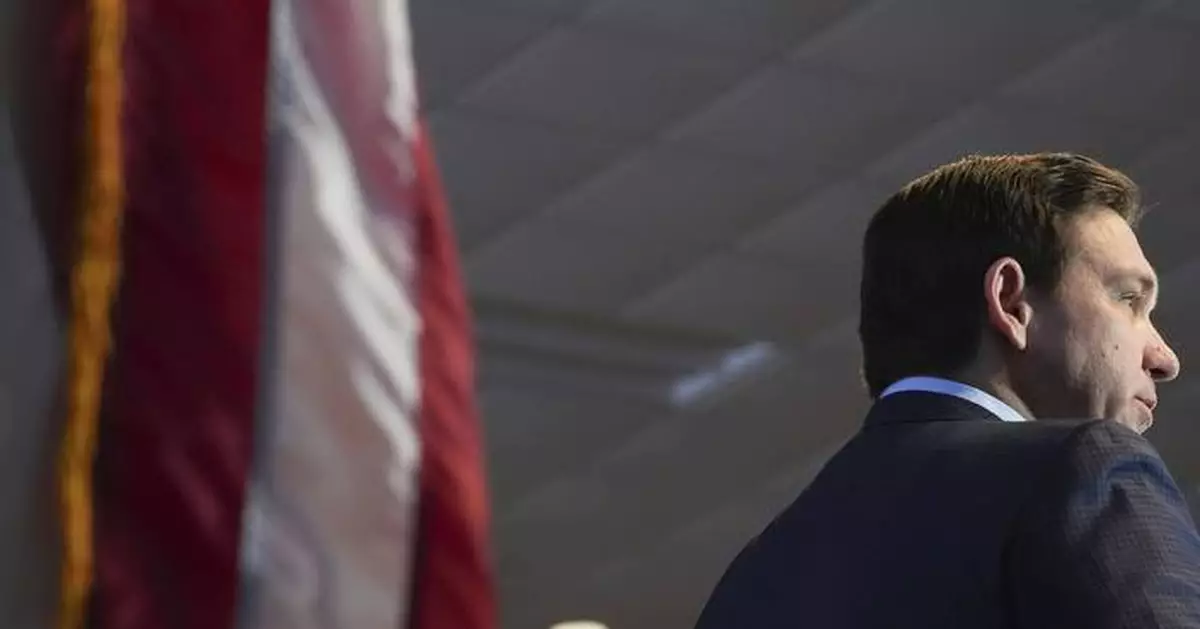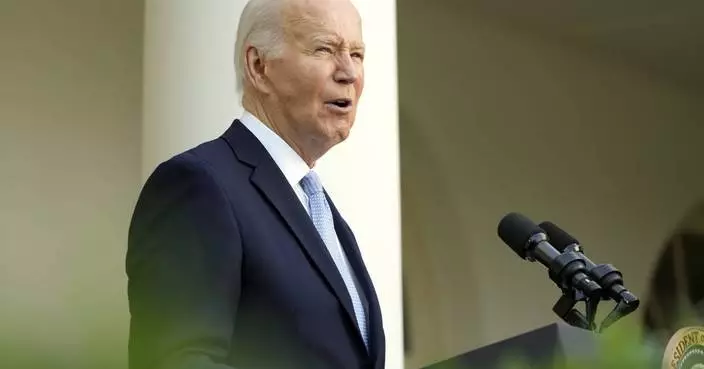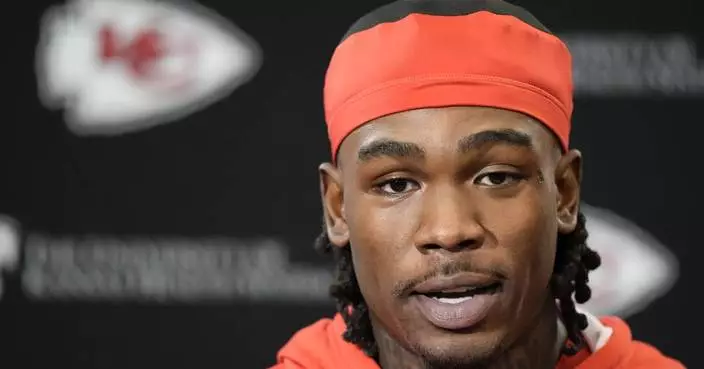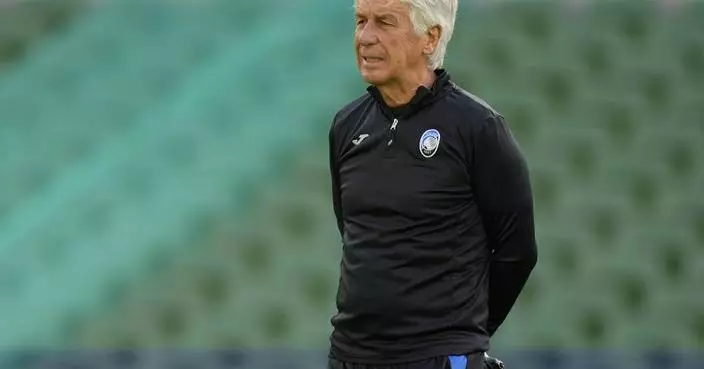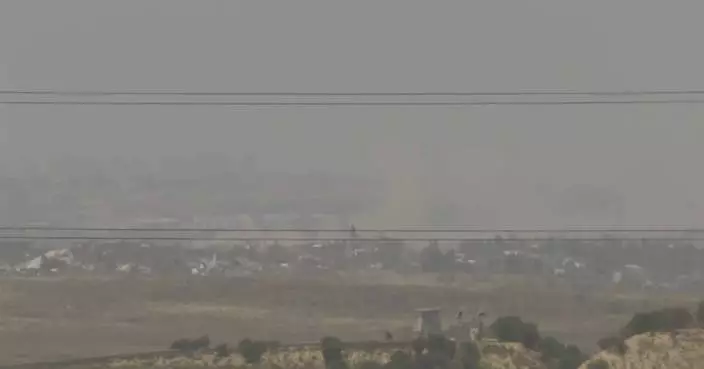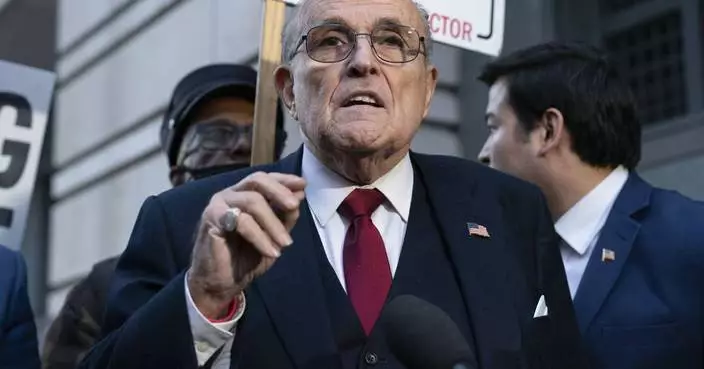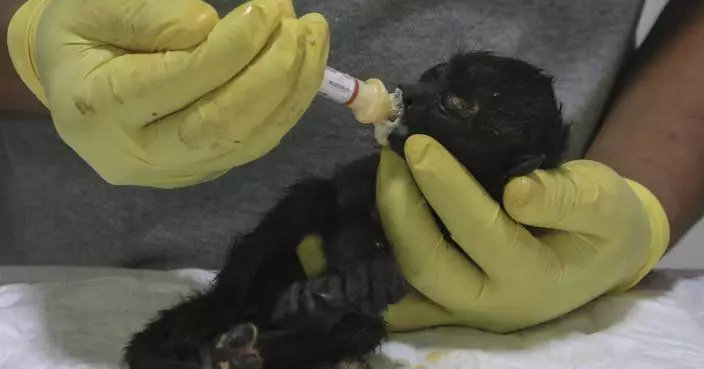NEW YORK (AP) — The defense rested its case in Donald Trump's hush money trial on Tuesday morning without the former president taking the witness stand to testify, bringing proceedings one step closer to closing arguments.
After more than four weeks of testimony, jurors were sent home with Judge Juan M. Merchan telling them they wouldn’t be needed in court until closing arguments next Tuesday. Merchan suggested the court session may run late that day to accommodate summations from both sides — the defense and prosecution. Merchan told jurors he then expects his instructions to them will take about an hour.
Jurors could begin deliberating as soon as next week to decide whether Trump is guilty of 34 felony counts of falsifying business records.
Prosecutors have accused Trump of a scheme to bury negative and often salacious stories that might have torpedoed his 2016 presidential campaign and then falsifying internal business records to cover up hush money payments associated with the alleged scheme. He has denied the allegations.
Prosecutors rested their case Monday after star witness Michael Cohen concluded his testimony. Cohen spent nearly four full days on the witness stand, placing the former president directly at the center of the alleged scheme. The defense called just two witnesses following the conclusion of Cohen's testimony — paralegal Daniel Sitko and attorney Robert Costello.
The trial is in its 20th day.
Trump has pleaded not guilty to 34 felony counts.
The case is the first-ever criminal trial of a former U.S. president and the first of four prosecutions of Trump to reach a jury.
Currently:
— Trump campaign calls Cannes film ‘The Apprentice’ ‘blatantly false,’ vows legal action
— Trump’s social media account shares a campaign video with a headline about a ‘unified Reich’
— Trump hush money case: A timeline of key events
— Key players: Who’s who at Trump’s hush money criminal trial
— Hush money, catch and kill and more: A guide to unique terms used at Trump’s trial
Here's the latest:
In another difference in the debate over jury instructions, the prosecution in Donald Trump's criminal trial wants jurors to be told that the concept of intending to defraud someone doesn’t necessarily mean the aim is to con someone out of money or property.
The defense, meanwhile, wants an instruction that the concept is about having a “conscious objective or purpose to lead another into” something to that person’s disadvantage.
The judge hasn’t yet decided on this issue.
As attorneys on both sides in Donald Trump's hush money trial haggled over the proposed tweaks to the jury instructions on Tuesday afternoon, the former president arranged sheets of papers on the desk before him.
After shuffling the stack on his knee, Trump directed his lawyer, Todd Blanche, to look at an image on one of the papers. Blanche smiled, cupped his hand over his mouth and then resumed listening to the conference.
Trump had started the hearing in his usual pose: leaned back in his chair with his eyes closed.
There was a markedly different atmosphere in the courtroom as the charging conference dragged on. The jurors were gone and there were several rows of empty seats in the gallery, which was packed earlier in the day for the conclusion of testimony.
Doling out a little humor at an otherwise dry charging conference, Judge Juan M. Merchan decided to remove a bit of legalese from the jury instructions after admitting he has no idea to pronounce it.
Joking that “the most challenging thing” facing him and the parties was figuring out how to pronounce the word “eleemosynary,” which means relating to charity or charitable.
“I’ve said it 100 times and I don’t know how to say it,” Merchan said. “So why do we need it?”
Merchan then elected to strike the word from jury instructions, but not before offering a little charity himself: spelling it for the court stenographer diligently taking down every word said in court.
As lawyers in Donald Trump's criminal case spar over the details of jury instructions, another point of contention has cropped up: what jurors will be told about how to view situations in which political candidates pay for things that aid their campaigns but also have other upsides.
Prosecutors want an instruction that someone’s status as a candidate doesn’t need to be the sole motivation for making a payment that benefits the campaign. Defense lawyers, meanwhile, want jurors to be told that if a payment would have been made even if the person wasn’t running, it shouldn’t be treated as a campaign contribution.
Merchan said he’ll decide later but is inclined to include both.
Judge Juan M. Merchan denied a defense request that he tell the jury in Donald Trump's criminal trial that there was no limit on federal candidates’ contributions to their own 2016 campaigns.
Trump lawyer Emil Bove suggested the language would help the jury “have a full picture of what constitutes contributions and expenditures” and understand that Trump could have paid such sums as the Stormy Daniels payout — if it were deemed a campaign contribution — from his own funds. Prosecutor Matthew Colangelo countered that campaign self-funding rules were “extraneous and totally irrelevant” to the case.
Merchan concluded it was unnecessary but told defense lawyers they could argue in their summation that Trump could have paid Daniels himself, instead of Cohen doing so.
Prosecutors and defense lawyers in Donald Trump's hush money trial began delving into the matter of jury instructions Tuesday afternoon during a charging conference.
“Charging conferences” about jury instructions are often highly detailed, word-by-word discussions, and the one for Trump's trial was no different. The conference began with the defense asking to insert the word “willfully” at two points in a section of the instruction having to do with federal election law, and prosecutors saying it was unnecessary.
Speaking to reporters in the hallway outside the courtroom where his hush money trial is being held, Donald Trump did not address why he didn’t testify in the trial.
With a charging conference set to take place this afternoon, Trump suggested that the judge could try to “manufacture” a crime.
“There is no crime. So maybe they’ll try to devise one right now,” he said. “The judge has been very helpful to the other side.”
Donald Trump is charged with 34 counts of falsifying business records in his hush money case.
The charge is a Class E felony in New York, the lowest tier of felony charges in the state. It is punishable by up to four years in prison, though there is no guarantee that a conviction would result in prison time.
To convict Trump, prosecutors must convince jurors beyond a reasonable doubt that he not only falsified or caused business records to be entered falsely — which would be a misdemeanor — but also that he did so to conceal another crime, making the charges felonies. Prosecutors allege the other crimes included violations of campaign finance and election law.
Any verdict must be unanimous.
New York court records and newspaper archives show defendants convicted of felony falsifying business records charges are seldom sentenced to prison for that offense alone. Often, the charge is coupled with more serious felonies like grand larceny.
Trump’s case involves only charges of falsifying business records. He has pleaded not guilty to the charges and denies any wrongdoing.
Donald Trump's motorcade has left Trump Tower and is on its way back to the courthouse where his hush money trial is being held.
Attorneys on both sides will meet for a charge conference with the judge overseeing the case.
The former president had returned to his residence during a midday break in court proceedings after the defense rested its case.
The jury in Donald Trump’s hush money trial is comprised of 18 Manhattan residents. The main jury includes seven men and five women.
Six alternate jurors have listened to the testimony, but won’t join in the deliberations unless one of the main jurors needs to drop out or is removed.
The jurors represent a diverse cross-section of the borough and come from various professional backgrounds, including a sales professional, a software engineer, a security engineer, a teacher, a speech therapist, several lawyers, an investment banker and a retired wealth manager.
Across more than four weeks of testimony in Donald Trump's hush money trial, prosecutors called 20 witnesses. The defense called just two.
Among the prosecution’s key witnesses: Trump’s former fixer Michael Cohen, porn actor Stormy Daniels, tabloid publisher David Pecker and lawyer Keith Davidson, who negotiated hush money deals for Daniels and former Playboy model Karen McDougal.
Cohen testified that he paid $130,000 in hush money to Daniels at Trump’s behest weeks before the 2016 election to keep her quiet about her claims of a sexual encounter with him a decade earlier. He also said that Trump was involved in an arrangement to reimburse him and log the payments as legal expenses.
Daniels gave an at-times graphic account of the alleged encounter. Pecker testified about agreeing to be the “eyes and ears” of Trump’s campaign by tipping Cohen off to negative stories, including Daniels’ claim.
Davidson talked about negotiating the deals and what he said was Cohen’s frustration after the Daniels deal that Trump still hadn’t repaid him. The defense’s big witness was attorney Robert Costello, who testified Monday and Tuesday about negotiating to represent Cohen after the FBI raided Cohen’s properties in 2018.
When court in Donald Trump's hush money trial resumes Tuesday afternoon, attorneys for both sides will return for a charging conference.
The charging conference is an opportunity for prosecutors and the defense to weigh in on how they want the jury to be instructed in the law and what the verdict sheet will look like.
At the conference, the parties may discuss how the charges are organized and the elements of a crime — spelled out in the law — that the prosecution needs to prove beyond a reasonable doubt to achieve a conviction.
They’ll provide the judge with their versions of instructions and the verdict sheet — a form the jury fills out listing each charge and the possible verdicts — but it’ll ultimately be up to Judge Merchan to decide how to instruct the jury.
Jury instructions are a roadmap to the sometimes complex legalities involved in the case. They are not designed to sway the jury one way or another, but rather to ensure that jurors have a good understanding of the charges they’re weighing and the laws involved.
After more than four weeks of testimony, jurors in Donald Trump's hush money trial could begin deliberating as soon as next week to decide whether the former president is guilty of 34 felony counts of falsifying business records.
Trump’s lawyers rested their defense Tuesday morning without him taking the witness stand, moving the case closer to the moment the jury would begin deciding his fate.
After the defense rested, Judge Juan M. Merchan told jurors the court session could run late next Tuesday to accommodate both prosecution and defense summations — the last time the jury will hear from either side.
A group of Donald Trump's allies that included Republican state leaders, lawmakers, state attorney generals and his son Donald Trump Jr. held a news conference near the courthouse in Manhattan on Tuesday morning.
“We are here because we are friends of Donald Trump, the president of the United States, and when a friend has trouble, friends have his back,” said Texas Lt. Gov. Dan Patrick. “If they can go after the former president of the United States of America, who has the ability and the financial resources to fight back, what happens to the average American?”
U.S. Rep. Troy Nehls of Texas wore a tie with photographs of Trump hugging the American flag patterned on it.
“They don’t want him on the ballot,” Nehls said, before comparing Trump’s ability to draw crowds to the pope. “This is five weeks in a courtroom when he should be out reaching the American people and telling the American people what he would like to do for this country.”
After the news conference, Donald Trump Jr. was asked why his father did not testify.
“There’d be absolutely no reason- no justification to do that whatsoever,” he said. “Everyone sees it for the sham that it is.”
As Donald Trump’s allies held a press conference near the Manhattan courthouse where his hush money trial is being held, a small group of demonstrators gathered in a nearby park with things growing heated between pro- and anti-Trump contingents.
Supporters shouted “We love Trump!” and waved American flags and a giant “TRUMP 2024 SAVE AMERICA” flag. Detractors shouted profanities.
Police officers then went into Collect Pond Park, telling them to “figure it out.”
Trump’s entourage has been holding its press conferences in the park in recent days, but the group was often drowned out on Monday by protesters.
Court in Donald Trump's hush money trial will resume at 2:15 p.m., when prosecutors and the defense will discuss the instructions that will be given to jurors before they start deliberating.
Judge Merchan has said he expects deliberations could begin as early as next Wednesday.
Trump, meanwhile, has returned to Trump Tower and will be back in court this afternoon.
Donald Trump left the courtroom where his criminal trial is taking place without speaking to reporters. He ignored a question about why he wouldn’t testify in the hush money case.
The former president and presumptive GOP presidential nominee previously said he wanted to take the witness stand to defend himself against what he claims are politically motivated charges.
The defense in Donald Trump's hush money trial rested its case Tuesday morning without the former president taking the stand in his own defense.
“Your honor, the defense rests,” Trump lawyer Todd Blanche told the judge.
After the defense rested, Judge Juan M. Merchan told jurors they won’t be needed again in court until next Tuesday. That’s when he says both sides will give their closing arguments. He suggested the court session may run late that day to accommodate summations from both sides — the defense and prosecution. Merchan told jurors he then expects his instructions to them will take about an hour, after which they can begin deliberating, possibly as early as next Wednesday.
Merchan noted that normally summations would immediately follow the defense resting its case, but he expects summations in this case will take at least a day and — given the impending Memorial Day holiday — “there’s no way to do all that’s needed to be done” before then.
“I’ll see you in a week,” Merchan said.
Before finishing her cross-examination Tuesday morning, prosecutor Susan Hoffinger questioned Robert Costello’s true intent in maneuvering to represent Michael Cohen, citing a June 22, 2018, email in which the lawyer complained that Cohen was continuing to “slow play us and the president.”
Costello was in talks with Cohen to represent him in the wake of an April 2018 FBI raid on his apartment, office and hotel room, but Cohen has said he was wary of Costello’s ties to the White House and never hired him.
“Is he totally nuts?” Costello wrote in the email to his law partner, Jeffrey Citron
In the email, he asked what he should say to Cohen, using an expletive. “He’s playing with the most powerful man on the planet,” Costello wrote.
“That email certainly speaks for itself, doesn’t it, Mr. Costello?” Hoffinger asked Costello, mimicking the witness’s earlier answers that emails he turned over to the prosecutors’ office “speak for themselves.”
“Yes, it does,” Costello replied.
Hoffinger then asked if, at that point, Costello had “lost control of Michael Cohen for the president, did you not?”
“Absolutely not,” Costello bristled.
Defense witness Robert Costello was on Tuesday morning behaving better in the courtroom than he was the previous day when Judge Juan M. Merchan scolded him for speaking out of turn and rolling his eyes.
Still, Costello tried to tack on extra details to his answers to questions from the prosecution.
At one point, Costello told prosecutor Susan Hoffinger that there was additional context around an email regarding Rudy Giuliani, “which I would be delighted to tell you.”
“That’s alright. Let’s move on to the next one,” Hoffinger said.
Moments later, Hoffinger asked Costello if he felt like he was being played by Cohen, as he had written in another email. Costello said he did not.
“You want me to explain it?” Costello asked.
Again, Hoffinger told him that she did not. Costello huffed, adding: “Now you do want me to explain.”
As testimony in Donald Trump's hush money trial began for the day, prosecutor Susan Hoffinger showed defense witness Robert Costello an August 2018 email in which former Trump attorney Michael Cohen told him and one of his partners to stop contacting him because “you do not and never have represented me” and another lawyer did.
Asked whether he was upset that Cohen hadn’t paid him, Costello said he was — and volunteered that he had replied to the message in an email that prosecutors didn’t show.
Hoffinger went a step further and confronted Costello with emails he sent to Cohen in which he repeatedly dangled his close ties to Trump-ally Rudy Giuliani in the aftermath of the FBI raid on Cohen’s property.
In one email, Costello told Cohen: “Sleep well tonight. You have friends in high places,” and relayed that there were “some very positive comments about you from the White House.”
Costello testified Tuesday that “friends in high places definitely refers to President Trump.”
Hoffinger also showed Costello an email he sent to his law partner noting that Giuliani was joining Trump’s legal team.
“All the more reason for Cohen to hire me, because of my connection to Giuliani, which I mentioned in our meeting,” Costello wrote to law partner Jeffrey Citron in the April 19, 2018, email.
Cohen says he never hired Costello.
Attorney Robert Costello has returned to the witness stand in Donald Trump's hush money trial to resume his testimony. The defense witness turned to Judge Juan M. Merchan and spoke to him briefly as they waited for the jury to file in.
Costello's words were inaudible to reporters. The judge acknowledged him, however, and nodded. The vibe in the courtroom was more cordial than it was during the drama that disrupted proceedings on Monday.
While waiting for the jury, Assistant District Attorney Joshua Steinglass asked the judge to poll jurors on their availability to work next Wednesday, a typical off day for the trial.
According to the judge, closing arguments will be held next Tuesday, the day after Memorial Day, so he may want jurors to work Wednesday to receive instructions in the law or start deliberating.
Donald Trump has arrived at the courthouse in lower Manhattan for the 20th day of his hush money trial.
Before court, the former president said, “We’ll be doing something in the morning and then probably coming back in the afternoon. And we’ll be resting pretty quickly.”
He added, however, “I won’t be resting. I don’t rest.
Donald Trump will be joined Tuesday by an entourage including actor Joe Piscopo as well as his eldest son, Donald Trump Jr., former acting attorney general Matt Whitaker and former Florida attorney general Pam Bondi, according to his campaign.
He’ll also be accompanied by members of Congress including Sen. Eric Schmitt and Reps. Ronny Jackson, Troy Nehls and Maria Salazar.
As witness testimony resumes in Donald Trump's criminal trial on Tuesday, a ruling on the defense's motion to dismiss the case is waiting in the wings.
Defense attorneys asked Judge Juan M. Merchan to dismiss the case on Monday after court adjourned for the day, arguing that prosecutors had failed to prove their case and there was no evidence of falsified business records or an intent to defraud.
Prosecutor Matthew Colangelo shot back that “the trial evidence overwhelmingly supports each element” of the alleged offenses, and the case should proceed to the jury.
Colangelo argued that the jury has seen “overwhelming” evidence that the records of the payments to Michael Cohen were falsely categorized as payments for legal services instead of reimbursement and that there was ample evidence that the alleged fudging was done to deceive people — including the voting public and government regulators.
Merchan did not indicate when exactly he would make a decision on the motion.
Attorney Robert Costello will return to the witness stand on Tuesday as Donald Trump's hush money trial enters its 20th day.
Costello's testimony was a source of discord on Monday between attorneys on both sides, with prosecutors arguing that he should not be allowed to testify at all.
Before the attorney took the stand, Judge Juan M. Merchan ruled that he would allow the defense to question him about two allegedly inconsistent statements in Michael Cohen’s testimony and to “offer some rebuttal” to his testimony.
Costello, a former federal prosecutor in New York, is relevant to Donald Trump’s hush money case due to his role as a Michael Cohen antagonist and critic in the years since their professional relationship splintered.
The attorney had offered to represent Cohen soon after the lawyer’s hotel room, office and home were raided by the FBI in 2018 and as he faced a decision about whether to remain defiant in the face of a criminal investigation or to cooperate with investigators in hopes of securing more lenient treatment.
Costello was invited last year to appear before the grand jury that indicted Trump after asserting that he had information that undermined Cohen’s credibility.
Closing arguments in Donald Trump's criminal trial could take place the day after Memorial Day.
Judge Juan M. Merchan said Monday that when the defense rests its case, he will send the jury home until closing arguments on the day after Memorial Day. Should that happen, jurors will spend a full week away from the trial.
Merchan cited scheduling issues in giving the May 28 date.
The defense is expected to rest its case on Tuesday after calling just a handfull of witnesses, including attorney Robert Costello.

Donald Trump Jr. speaks outside Manhattan criminal court, Tuesday, May 21, 2024, in New York. (AP Photo/Julia Nikhinson)

Donald Trump Jr. speaks outside Manhattan criminal court, Tuesday, May 21, 2024, in New York. (AP Photo/Julia Nikhinson)

Supporters including, from left, former Florida Attorney General Pam Bondi, former Acting United States Attorney General Matthew Whitaker, Donald Trump Jr., U.S. Rep. Ronny Jackson, R-Texas,, U.S. Sen Eric Schmitt, R-Mo., US Rep. Troy Nehls, R-Texas, and radio host Sebastian Gorka, right, listen as former President Donald Trump speaks outside the courtroom at Manhattan Criminal Court, Tuesday, May 21, 2024, in New York (Justin Lane/Pool Photo via AP)

Former President Donald Trump and his attorney Todd Blanche arrive at Manhattan Criminal Court, Tuesday, May 21, 2024, in New York. (Justin Lane/Pool Photo via AP)

Former President Donald Trump sits in court at Manhattan criminal court, Tuesday, May 21, 2024 in New York. (Curtis Means/DailyMail.com via AP, Pool)

Former President Donald Trump sits in Manhattan Criminal Court on Tuesday, May 21, 2024 in New York. (Michael M. Santiago/Pool Photo via AP)

Former President Donald Trump speaks to media before his trial at the Manhattan criminal court, Tuesday, May 21, 2024, in New York. (Michael M. Santiago/Pool Photo via AP)

Former president Donald Trump waves while leaving Trump Tower on his way to Manhattan criminal court, Tuesday, May 21, 2024, in New York. (AP Photo/Julia Nikhinson)

Former President Donald Trump sits in Manhattan criminal court, Tuesday, May 21, 2024 in New York. (Justin Lane/Pool Photo via AP)

Former President Donald Trump sits in Manhattan Criminal Court on Tuesday, May 21, 2024 in New York. (Michael M. Santiago/Pool Photo via AP)

Former President Donald Trump sits in Manhattan Criminal Court during his ongoing hush money trial, Monday, May 20, 2024, in New York. (Mark Peterson/Pool Photo via AP)

Former President Donald Trump speaks to the media, alongside attorney Todd Blanche, following the day's proceedings at his hush money trial, in New York, Monday, May 20, 2024. (Mark Peterson/New York Magazine via AP, Pool)

Judge Juan Merchan, left, castigates witness Robert Costello about his "decorum" in the courtroom in Manhattan criminal court, Monday, May 20, 2024, in New York. (Elizabeth Williams via AP)

Former President Donald Trump sits in Manhattan Criminal Court during his ongoing hush money trial, Monday, May 20, 2024, in New York. (Mark Peterson/Pool Photo via AP)



